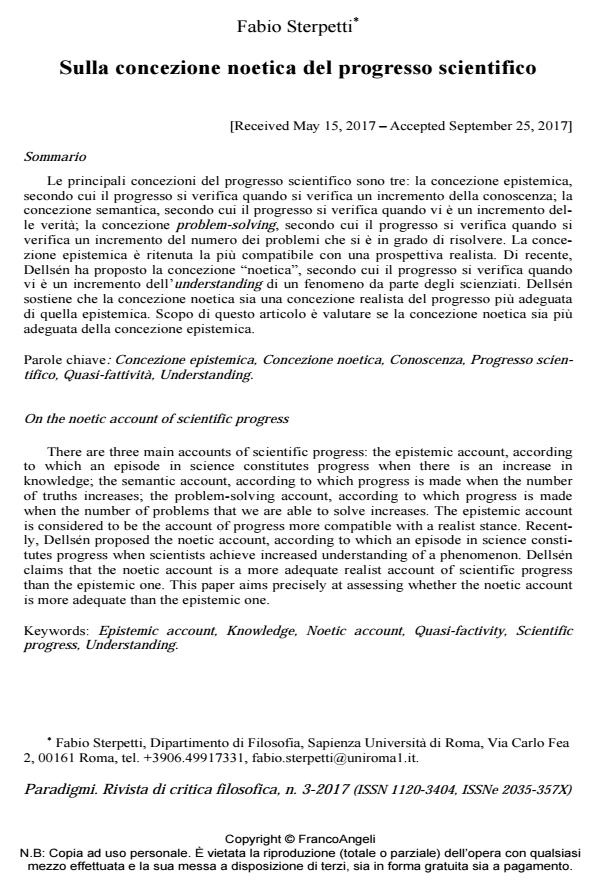Sulla concezione noetica del progresso scientifico
Titolo Rivista PARADIGMI
Autori/Curatori Fabio Sterpetti
Anno di pubblicazione 2017 Fascicolo 2017/3 Lingua Italiano
Numero pagine 21 P. 135-155 Dimensione file 229 KB
DOI 10.3280/PARA2017-003010
Il DOI è il codice a barre della proprietà intellettuale: per saperne di più
clicca qui
Qui sotto puoi vedere in anteprima la prima pagina di questo articolo.
Se questo articolo ti interessa, lo puoi acquistare (e scaricare in formato pdf) seguendo le facili indicazioni per acquistare il download credit. Acquista Download Credits per scaricare questo Articolo in formato PDF

FrancoAngeli è membro della Publishers International Linking Association, Inc (PILA)associazione indipendente e non profit per facilitare (attraverso i servizi tecnologici implementati da CrossRef.org) l’accesso degli studiosi ai contenuti digitali nelle pubblicazioni professionali e scientifiche
Le principali concezioni del progresso scientifico sono tre: la concezione epistemica, secondo cui il progresso si verifica quando si verifica un incremento della conoscenza; la concezione semantica, secondo cui il progresso si verifica quando vi è un incremento delle verità; la concezione problem-solving, secondo cui il progresso si verifica quando si verifica un incremento del numero dei problemi che si è in grado di risolvere. La concezione epistemica è ritenuta la più compatibile con una prospettiva realista. Di recente, Dellsén ha proposto la concezione "noetica", secondo cui il progresso si verifica quando vi è un incremento dell’understanding di un fenomeno da parte degli scienziati. Dellsén sostiene che la concezione noetica sia una concezione realista del progresso più adeguata di quella epistemica. Scopo di questo articolo è valutare se la concezione noetica sia più adeguata della concezione epistemica.;
Keywords:Concezione epistemica, Concezione noetica, Conoscenza, Progresso scien-tifico, Quasi-fattività, Understanding.
- Barrett J.A. (2008). Approximate Truth and Descriptive Nesting. Erkenntnis, 68, 2: 213-224,
- Barrett J.A. (2003). Are Our Best Physical Theories Probably and/or Approximately True? Philosophy of Science, 70, 5: 1206-1218, DOI: 10.1086/377401
- Bird A. (2007). What is Scientific Progress? Noûs, 41, 1: 64-89.
- Calude C.S. and Longo G. (2016). The Deluge of Spurious Correlations in Big Data. Foundations of Science,
- Cellucci C. (2013). Rethinking Logic. Logic in Relation to Mathematics, Evolution, and Method. Dordrecht: Springer.
- Chakravartty A. (2015). Scientific Realism. In: Zalta E.N., ed. The Stanford Encyclopedia of Philosophy (Fall 2015 Edition), URL = <http://plato.stanford.edu/archives/fall2015/entries/scientific-realism/>.
- Chang H. (2007). Scientific Progress: Beyond Foundationalism and Coherentism. Royal Institute of Philosophy Supplement, 61: 1-20.
- Dellsén F. (2016). Scientific Progress: Knowledge versus Understanding. Studies in History and Philosophy of Science, 56: 72-83,
- de Regt H.W. (2009). Understanding and Scientific Explanation. In: de Regt H.W., Leonelli S. and Eigner K., eds., Scientific Understanding. Pittsburgh: Pittsburgh University Press: 21-42.
- de Regt H.W. (2015). Scientific Understanding: Truth or Dare? Synthese, 192, 12: 3781-3797.
- de Regt H.W. and Gijsbers V. (forthcoming). How False Theories Can Yield Genuine Understanding. In: Grimm S.R., Baumberger C. and Ammon S., eds. Ex-plaining Understanding. New York: Routledge.
- Einstein A. (1956). On the Movement of Small Particles Suspended in a Stationary Liquid Demanded by the Molecular Kinetic-Theory of Heat. In: A. Einstein, Investigations on the Theory of the Brownian Movement. New York: Dover: 1-18. Ediz. originale (1905). Über die von der molekularkinetischen Theorie der Wärme geforderte Bewegung von in ruhenden Flüssigkeiten suspendierten Teilchen. Annalen der Physik, 322, 8: 549-560.
- Elgin C. (2009). Is Understanding Factive? In: Haddock A., Millar A. and Pritchard D., eds. Epistemic Value. Oxford: Oxford University Press: 322-330.
- Elgin C. (2007). Understanding and the Facts. Philosophical Studies, 132, 1: 33-42.
- Grimm S. (2006). Is Understanding a Species of Knowledge? The British Journal for the Philosophy of Science, 57, 3: 515-535,
- Ippoliti E. (2014). Generation of Hypotheses by Ampliation of Data. In: Magnani L., ed. Model-Based Reasoning in Science and Technology. Theoretical and Cognitive Issues. Berlin: Springer: 247-262.
- Ippoliti E. e Cellucci C. (2016). Logica. Milano: Egea.
- Khalifa, K. (2011). Understanding, Knowledge, and Scientific Antirealism. Grazer Philosophische Studien, 83: 93-112.
- Kuhn T.S. (19702). The Structure of Scientific Revolutions. Chicago: University of Chicago Press.
- Kvanvig, J.L. (2003). The Value of Knowledge and the Pursuit of Understanding. New York: Cambridge University Press.
- Laudan L. (1977). Progress and its Problems. London: Routledge.
- Laudan L. (1981). A Confutation of Convergent Realism. Philosophy of Science, 48, 1: 19-48.
- Lycan W.G. (2006). On the Gettier Problem Problem. In: Hetherington S., ed. Epistemology Futures. Oxford: Oxford University Press: 148-168.
- Mizrahi M. (2012). Idealizations and Scientific Understanding. Philosophical Studies, 160, 2: 237-252,
- Niiniluoto I. (2015a). Optimistic Realism about Scientific Progress. Synthese,
- Niiniluoto I. (2015b). Scientific Progress. In: Zalta E.N., ed. The Stanford Encyclopedia of Philosophy (Summer 2015 Edition), URL: <http://plato.stanford.edu/archives/sum2015/entries/scientific-progress/>.
- Popper K.R. (1963). Conjectures and Refutations. London: Routledge & Kegan Paul.
- Rancourt B.T. (2015). Better Understanding through Falsehood. Pacific Philosophical Quarterly,
- Rowbottom D.P. (2010). What Scientific Progress Is Not: Against Bird’s Epistemic View. International Studies in the Philosophy of Science, 24, 3: 241-255.
- Saatsi J. (2016). What is Theoretical Progress of Science? Synthese,
- Stanford K. (2003). Pyrrhic Victories for Scientific Realism. Journal of Philosophy, 100, 11: 553-572,
- Votsis I. (2011). The Prospective Stance in Realism. Philosophy of Science, 78, 5: 1223-1234, DOI: 10.1086/66253
- Wray K.B. (2013). Success and Truth in the Realism/Anti-Realism Debate. Synthese, 190, 9: 1719-1729.
- Zagzebski, L. (2001). Recovering Understanding. In: Steup M., ed. Knowledge, Truth, and Duty. New York: Oxford University Press: 235-251.
Fabio Sterpetti, Sulla concezione noetica del progresso scientifico in "PARADIGMI" 3/2017, pp 135-155, DOI: 10.3280/PARA2017-003010